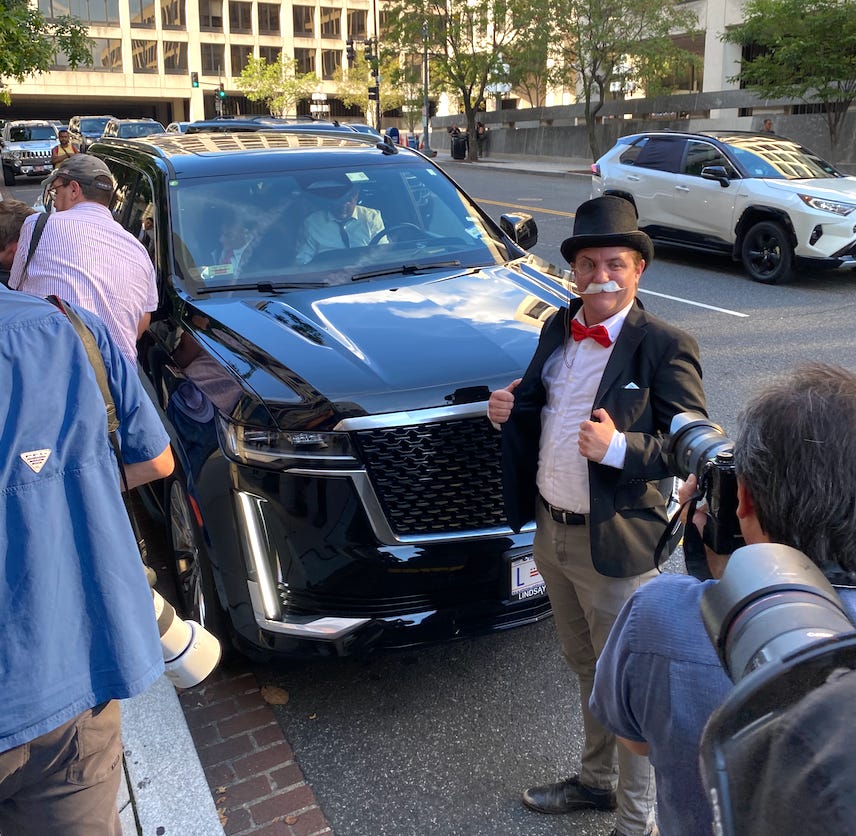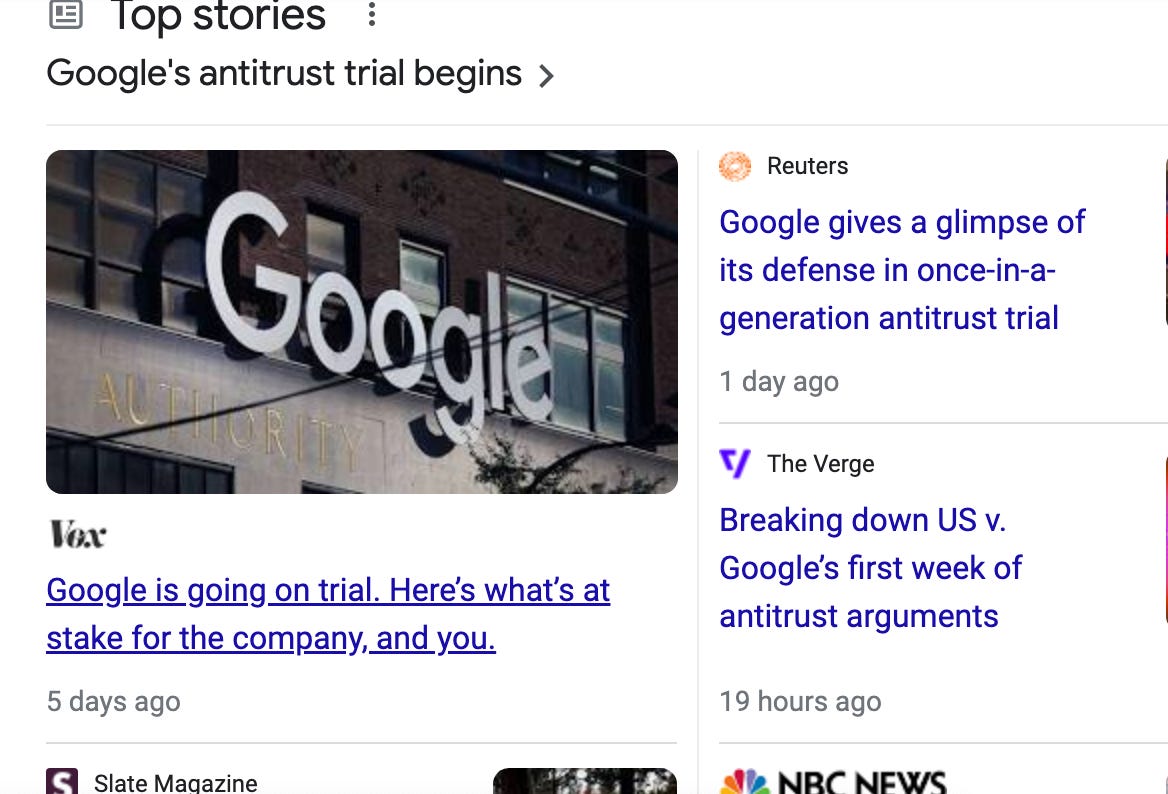The Google antitrust trial is just getting started
Looking back on the first week of action in the courtroom — and what still lies ahead
Welcome to Big Tech on Trial, a newsletter covering the Google antitrust trial. If you’d like to sign up to receive issues over email, you can do so here.

“Your Honor, this case is about the future of the internet and whether Google’s search engine will ever face meaningful competition.”
That was part of the opening statement by DOJ lawyer Kenneth Dintzer for the biggest monopolization trial in 25 years — the government’s case against Google, the search giant that has become its own verb. And the importance of the trial was clear on Tuesday. The courtroom was packed, and included DOJ antitrust head Jonathan Kanter and Google’s chief legal officer Kent Walker, as well as Congressman Ken Buck of Colorado, the former chief Republican on the House Antitrust Subcommittee.
By the time court broke for lunch, as I wrote after Day One, we had heard the lead lawyers for each party lay out their cases.1 The basic question underpinning the trial is why is Google search so popular? Is it because everyone loves it? Or because it engages in unlawful behavior to exclude rivals? Both sides explained their economic theories and previewed the testimony Judge Amit Mehta would hear, but they also delivered sharp punches.
A key part of the argument for the government is that Google can’t be trusted. For instance, after displaying a screenshot of Google CEO Sundar Pichai asking for the setting in an internal group chat to be turned to “history off” — an example of Google’s alleged destruction of evidence it should have been preserving for this litigation — DOJ’s lead trial lawyer Kenneth Dintzer produced a zinger: “They turned history off, your Honor, so they could rewrite it here in this courtroom.”
Not to be out-done, Google’s trial-lead John Schmidtlein, of the elite law firm Williams and Connolly, fired back at comparisons of Google to Microsoft in the 1990s. “Who do the plaintiffs today say is the competitor that was blocked out of the market?” Schmidtlein asked rhetorically. “It’s not some small innovative tech company like Netscape, who didn’t have the means to compete against a significant competitor even with a superior product. The plaintiffs’ supposed victim? Microsoft.” Schmidtlein’s apparent goal is to make the case about Google vs. Microsoft, to make it seem like the government is protecting another tech giant with enough resources to compete, but not a good enough search engine.
The drama continued into the afternoon as the DOJ put on its first witness, Google’s chief economist and longtime employee Hal Varian, a sort of legendary figure in the field of network economics who has authored two bestselling textbooks. The first document DOJ asked Varian about was a memo he wrote all the way back in 2003. The memo stated that “Google was a dominant player in the industry” that was “trying to discourage entry by a potential competitor.” It also included a warning to Google employees: “We should be careful about what we say in both public and private.”
Varian’s testimony — which continued into Day 2 of the trial — was evasive and argumentative, so much so that he drew comparisons from former Biden antitrust policy advisor Tim Wu to the famously slippery Bill Gates deposition testimony that was played on video during the US v. Microsoft trial in 1998.
Tuesday’s drama didn’t end when Judge Mehta adjourned for the day. As the legal teams for both sides walked out of the courthouse, they were greeted by close to a dozen photographers and camera crews trying to get shots of the case’s key figures. It was amidst this scene that a person dressed up as Mr. Monopoly shadowed Google’s legal chief Walker while he walked to the black SUV waiting for him.
The press covered the trial extensively, as did Wall Street analysts keeping tabs on the stock of involved companies. (Apple is quite vulnerable here as well — outside of the courtroom, it has been estimated that Apple received up to $20 billion from Google in 2022 for default search engine placement on Safari.)
The power of defaults
Since Tuesday, neither Walker nor Kanter have returned to the courtroom. There aren’t photographers waiting outside of the courthouse entrance anymore. And you don’t need to line up at the crack of dawn to guarantee a seat in the courtroom anymore; on Thursday, and Friday, you could have walked into the courtroom any time during the day and had plenty of space around you to stretch in the back couple of rows.
The case hinges on the power of defaults, or the ways that device makers and browser producers preload their products with Google search, for money. Apple, for instance, puts Google as the default on the iPhone Safari browser, for $10 billion+ a year in annual revenue. As Matt put it, the government’s argument is essentially that Google has bought up all the shelf space to block rivals from appearing in the market.
As such, in addition to Varian — who was challenged about his claims that Google’s scale played a limited role in Google search’s dominance — we’ve heard testimony from a behavioral-economics expert witness and two employees of Google who had significant responsibilities in negotiating Google’s default search placement with various corporate partners.
Antonio Rangel, the behavioral economics expert witness who teaches at Caltech, shared several well-articulated conclusions including that “search engine defaults generate a sizeable and robust bias towards the default.” Rangel also testified about a natural experiment that occurred when Google agreed to release a search engine choice screen for Android users in Russia. He walked the court through how the introduction of this choice screen led to the order of search engine dominance in Russian Android devices “flip[ing]” from Google to the Russian search engine Yandex.2 The upshot from DOJ’s direct-examination of Rangel, which also spanned two days of the trial, was that default placement — rather than product quality — can explain why many consumers use Google.
In Google’s cross-examination, Schmidtlein drew blood. Schmidtlein showed Rangel data on the percentage of search queries going through Bing and Yahoo when those search engines were placed as the default on BlackBerry phones for different mobile carriers. Throwing Rangel’s words back at him, Schmidtlein asked whether the effect of Bing and Yahoo defaults looked “sizeable and robust” from this data. Rangel conceded that in this specific data, the effect of the Bing default in a specific device at a specific time “looks small.” The intended implication seemed to be that Google defaults wouldn’t be so powerful if Google didn’t have the best search engine.
DOJ’s examination of Google employees Chris Barton3 and Jim Kolotorous4 highlighted the strategic priority Google placed on securing exclusive default agreements with mobile device makers and carriers. This testimony can get pretty technical with frequent discussion of “MADAs” (Mobile App Distribution Agreements) and “RSAs” (Revenue Share Agreements), but it’s developing one of DOJ’s core arguments that Google cares deeply about securing default placement for its search engine.
Perhaps the most interesting testimony from these two employees came at the very end of the week on Friday, after the sides questioned Kolotorous in sealed court for a couple of hours about confidential details of Google’s partnerships. When court re-opened to the public, the DOJ’s lawyer told Kolotorous she wanted to switch gears to his written communications. She then spent the remainder of her time with Kolotorous asking him about his practices of copying attorneys on business emails and keeping the history off on his Google chats even after he was placed on a litigation hold. Both of these practices were the subjects of separate DOJ motions for sanctions against Google and figure to continue to be key issues in the case.
What lies ahead

We’ve only gotten through three and a half days of the trial so far and likely have at least two more months of trial ahead of us. Those two months will include the affirmative cases brought by the DOJ and the states, Google’s defense, and an opportunity for the government plaintiffs to rebut Google’s defense.
DOJ announced the first two witnesses it would be calling next week: Brian Higgins and Jerry Dischler. According to his LinkedIn page, Higgins has had a range of roles at Verizon dating all the way back to 2001 and currently serves as the carrier’s Chief Customer Experience Officer. Dischler is Vice President and General Manager of Ads at Google — his page on Google’s blog says he “oversees Google’s Advertising products including search, display, shopping, travel and video advertising, as well as analytics.”
Higher-profile witnesses are expected to be put on the stand later on in the trial as well. DOJ’s opening statement indicated that both Google CEO Sundar Pichai and Microsoft CEO Satya Nadella would be called, as well as senior Apple executives Eddy Cue and John Giannandrea.
When this trial ends — most likely sometime in November — we won’t get a verdict announced in court like we would if it was a jury trial; instead, Judge Mehta will have to produce a written opinion, which almost certainly won’t come out until 2024. And that will only be to decide if Google is liable for antitrust violations. A separate trial would be necessary to determine the proper remedy if Google is found liable. Appeals to the DC Circuit Court and US Supreme Court would be likely to follow, and perhaps even Congressional action.
The Google trial is the first of a wave of monopolization trials likely to take place over the next few years. It’s likely Amazon will face an antitrust suit, Facebook will go to trial in 2024, and there will be a separate Google trial next year on a different part of its business. In addition, Ticketmaster is being investigated for monopolization, and there are reports of investigations of other dominant firms. How these suits play out, and how and whether Congress reacts, may not only affect the shape of Silicon Valley, but also American society at large.
If you’re interested in following how this trial continues to unfold into November, you can subscribe for free to Big Tech on Trial to have daily coverage sent directly to your email.
* Note (6:41 pm on Sept. 16): I removed a paragraph that was in this article earlier about there not being much discussion of the relevant market issue so far. As a reader pointed out to me, there has been a decent amount — it has just been qualitative evidence, rather than quantitative. I’ll try to flesh out this issue a bit more in a future post.
In addition to the DOJ and Google, a coalition of 38 state attorney generals is also pursuing a claim in the case related to Google's advertising management platform called SA360.
Matt wrote about Yandex’s competition with Google in Russia back in 2019: How Russian Antitrust Enforcers Defeated Google’s Monopoly.”
Chris Barton, founder of Shazam, worked at Google from 2004 to 2011 and was the first Google employee to work on distributing Google search through mobile device makers and carriers.
Jim Kolotorous, who is currently Google’s VP of Android Platform Partnerships, testified that he has worked at Google for about 20 years.






Why does it matter whether Google is the best search engine, or whether people prefer it? Even if both of those are true (and I think they probably are), surely Google’s behavior could still be anticompetitive?
Thank you for terrific coverage, and for presenting the courtroom action in context. And kudos to Matt for hiring Yosef.